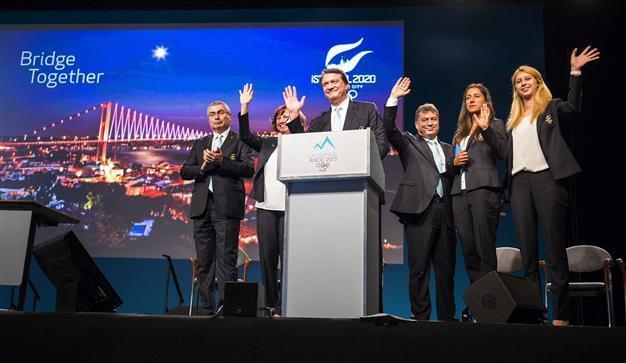Turkey’s double bid, Olympiads and EXPO 2020 to be decided in fall

“Turkey contributed more than $1 billion in humanitarian aid last year, making it the fourth-largest government donor, highlighting the role of new countries in the aid landscape.”
For the international reader who might not be very familiar with Turkey, the above sentence, which appeared in an article published by The Guardian last month, may come as a surprise. Yet for those familiar with the Turkish government’s ambition to become a global player, the fact that Turkey ranked behind only the U.S. ($3.8 billion), the EU ($1.9 billion) and the U.K. ($1.2 billion), hardly comes as a surprise.
There are two major reasons for Turkey to emerge recently as an “emerging donor,” according to a Turkish official. First is related to the improvement of the Turkish economy. “Economic resources have increased, enabling Turkey to earmark a budget for international humanitarian aid,” the official told me.
“Second, there is political will to use economic resources to become an international donor.”
Obviously the political will, that is, the government of the Justice and Development Party (AKP), wants to use this as a foreign policy tool to gain influence in world affairs. Let’s recall that Turkey became increasingly aware of the importance of humanitarian assistance in the international arena in the second half of the 2000s, when it competed for U.N. Security Council nonpermanent membership status for the 2009-10 period.
While an important proportion of Turkey’s contribution last year was spent on Syrian refugees, we can be sure that the AKP government will step up its humanitarian assistance efforts next year as the elections for the U.N. Security Council seat for the 2015-16 period, for which Turkey competes with Spain and New Zealand, will take place next September.
We are a year away from that challenge. Prior to that, this fall will witness a double challenge as Istanbul’s bid for the 2020 Olympic Games and İzmir’s bid for EXPO2020 will be decided in September and November consecutively.
While it is too early to make an assessment, the picture in the race for the seat in New York looks bright so far. I wonder if we can say the same for Istanbul and İzmir. Competing with Madrid and Tokyo, Istanbul’s biggest advantage is the fact that the Olympic Games have never been held in a Muslim country. But a string of doping scandals in the country since the beginning of the year might overshadow Istanbul’s advantages.
The final decision will be taken on Sept. 7; it will be closely watched by those lobbying for EXPO2020, which will be decided in November. If Istanbul loses the bid, will it increase the chances of İzmir? In contrast, if Istanbul will be the winner, would that negatively affect İzmir’s bid?
Having three major candidacies in one year is certainly not helping Turkey’s hand. What’s for sure is that all these processes gain Turkey tremendous experience. Yet experiences are valuable when you draw the right lessons and don’t repeat past mistakes.
One of the reasons why İzmir lost its bid for EXPO2015 was the lack of cooperation and even the contention between major stakeholders in the campaign. We will see in November to what degree it was a wise decision to change İzmir’s governor, who is a major player in the campaign, six months prior to the elections in Paris. One will hope that İzmir’s new governor is a quick learner, since the city is facing a major challenge from Dubai, as well as Yekaterinburg and Sao Paulo.
Let’s also hope that the government does not keep from sparing any effort for İzmir, a traditional stronghold of the opposition Republican People’s Party.
 “Turkey contributed more than $1 billion in humanitarian aid last year, making it the fourth-largest government donor, highlighting the role of new countries in the aid landscape.”
“Turkey contributed more than $1 billion in humanitarian aid last year, making it the fourth-largest government donor, highlighting the role of new countries in the aid landscape.”